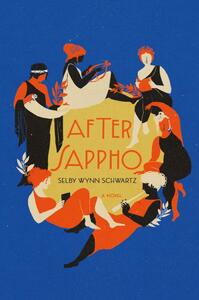Take a photo of a barcode or cover
Well I learned a lot! I found myself having to look up people, go back to remember who was who, but overall this was an interesting read about lesbian women at the turn of the 20th century. Although, this was a very niche group of wealthy mostly white women at this time, with resources for writing, poetry and education. I mostly liked the passages about the conflict between wanting to live in an isolated world based on the past (Sappho) and trying to modernize the same ideals but in the changing world.
challenging
emotional
inspiring
reflective
slow-paced
Plot or Character Driven:
Character
Strong character development:
Yes
Loveable characters:
Yes
Diverse cast of characters:
Complicated
Flaws of characters a main focus:
No
Is it a novel? A very long prose poem? A history? An alternative history? (All histories are to some extent alternative histories it depends how many liberties the writer took)? A work of scholarship?
Those questions make it sound dry. It wasn't dry. Some parts in the middle were slow moving and repetitive. It was not a book to eagerly finish in one night it benefitted from a slower pace. It's broken into chunks to allow you to travel slowly on days when you need to, to read more frivolous stuff next to it.
But it was also entertaining, joyful at times (exasperated but determined in others)> I don't know if all those women (and Oscar Wilde) were in fact so woven together or if that's a fancy of the author. It works because it creates/recreates Sappho in them, in history, potentially in us. As a writer I found the attitude to feminist writing in the book really refreshing and motivating (and upon finishing the book I actually did do some of my own writing which is why this review is hours later).
It's a very very feminist book. But the story of women wanting something other than wife-and-mother-and-victimhood needs to be told and retold until the powers that be get it until the powers that be include women more. The complications and disagreements were not erased. Some women continue to be defiantly women and some choose to break out from a gender they never chose. Most do both to some extent. As an AFAB non-binary person I saw myself in "Sappho" (which is all of us) in the book. Also Sapphic love in the book includes but is not limited to sex (if I understood right) which was refreshing. As a side question- was Radclyffe really that much of a bore or does the author just dislike Well of Loneliness? I assume there is research behind Hall's conservatism. How depressing!
I love that when women refuse to be victims and break out in wild and joyful ways the book shows that they are not perfect, pure or even necessarily Utopian (except in hedonistic ways) they can still be wrong. Not victims. Not angels. But free and complex. Also I love that Sapphic love is shown to lurk at the heart of what women are in essence. Normally I would stay clear of essentialism but this was a good and subversive use of it (and the way it comes out is not exactly deterministic).
I'll keep this one to read (slowly) again some time. A very worthwhile read for any sapphist or feminist writer.
Those questions make it sound dry. It wasn't dry. Some parts in the middle were slow moving and repetitive. It was not a book to eagerly finish in one night it benefitted from a slower pace. It's broken into chunks to allow you to travel slowly on days when you need to, to read more frivolous stuff next to it.
But it was also entertaining, joyful at times (exasperated but determined in others)> I don't know if all those women (and Oscar Wilde) were in fact so woven together or if that's a fancy of the author. It works because it creates/recreates Sappho in them, in history, potentially in us. As a writer I found the attitude to feminist writing in the book really refreshing and motivating (and upon finishing the book I actually did do some of my own writing which is why this review is hours later).
It's a very very feminist book. But the story of women wanting something other than wife-and-mother-and-victimhood needs to be told and retold until the powers that be get it until the powers that be include women more. The complications and disagreements were not erased. Some women continue to be defiantly women and some choose to break out from a gender they never chose. Most do both to some extent. As an AFAB non-binary person I saw myself in "Sappho" (which is all of us) in the book. Also Sapphic love in the book includes but is not limited to sex (if I understood right) which was refreshing. As a side question- was Radclyffe really that much of a bore or does the author just dislike Well of Loneliness? I assume there is research behind Hall's conservatism. How depressing!
I love that when women refuse to be victims and break out in wild and joyful ways the book shows that they are not perfect, pure or even necessarily Utopian (except in hedonistic ways) they can still be wrong. Not victims. Not angels. But free and complex. Also I love that Sapphic love is shown to lurk at the heart of what women are in essence. Normally I would stay clear of essentialism but this was a good and subversive use of it (and the way it comes out is not exactly deterministic).
I'll keep this one to read (slowly) again some time. A very worthwhile read for any sapphist or feminist writer.
This book was not engaging. The short excerpts made the book clunky and difficult to follow.
inspiring
reflective
medium-paced
Plot or Character Driven:
A mix
Strong character development:
N/A
Loveable characters:
Yes
Diverse cast of characters:
Yes
Flaws of characters a main focus:
N/A
adventurous
emotional
reflective
sad
medium-paced
Plot or Character Driven:
A mix
Strong character development:
Yes
Loveable characters:
Yes
Diverse cast of characters:
No
Flaws of characters a main focus:
No
Interesting, a little experimental, and a large part of the second half concerned the life, literature, and loves of Virginia Woolf. Selby Wynn Schwartz's work takes the form of sort of prose-poem vignettes, and (as one might guess from the title), largely concerns the lives of women, and the women who love them, around the end of the 19th century, and the tumultuous beginning of the 20th.
I really ended up enjoying this, although it definitely rewards taking care and time to contemplate each little narrative. Like a pure chocolate, this was good, and a little bitter.
I really ended up enjoying this, although it definitely rewards taking care and time to contemplate each little narrative. Like a pure chocolate, this was good, and a little bitter.
hopeful
inspiring
slow-paced
Plot or Character Driven:
Character
Strong character development:
Complicated
Loveable characters:
Complicated
Diverse cast of characters:
Complicated
Flaws of characters a main focus:
No
i wanted to like this book so much. it has everything i should like! lesbians! sappho! history! lyrical writing! but alas i could not get into it. i read it halfway through but i couldn’t figure out who was the main character? the book introduced like three new characters per page and they all had long old fashioned names and then most of them made up seperate names for themselves so they were referred to using like three different names and i never knew who was who and why i should care. i think part of it was that i went into this thinking it’s fiction but it’s more like a historical non-fiction book written in a unique way. i do feel like others might enjoy this book but sadly i did not. i’m giving up or else i will not read anything else.
probably wasn’t two stars bad i just hated it please a bit of plot would be wonderful
challenging
dark
informative
slow-paced
Plot or Character Driven:
Character
The writing style for me personally was too hard to follow. I may try it again in the future




